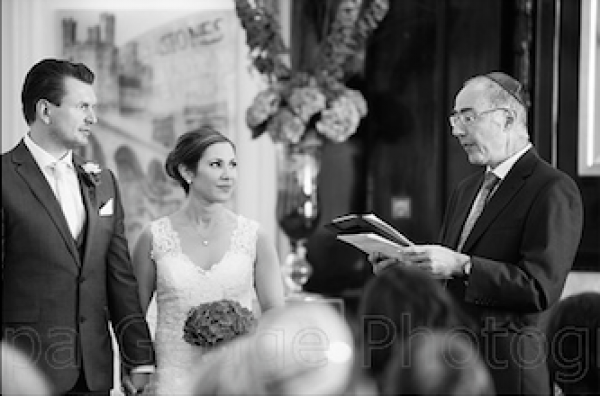
by Michael | Oct 13, 2015 | Blog
I am beginning to learn that it doesn’t really pay to hide one’s light under a bushel.
Parlez-vous mariage?
People think of me as a civil celebrant, but I am also a linguist. Apart from a decent command of my native language, I have a degree in French and Russian, speak fluent German, read Hebrew and get by in Czech and Italian.
Being the sort of businessman that I am, it never occurred to me until recently that that might be an asset to my current profession! But now I know differently.
One of my present assignments is working on a wedding service for a couple from mixed cultures: he is British, but she is Russian. There will be a few guests coming over from Magnetogorsk, so I suggested welcoming them in their native language. Wow! This idea has gone down a treat!
Well, when you think about it, it makes sense. Of course, I’ll have to work out how best to market this asset, as the language bit may appeal to quite a number of couples. Indeed, maybe this would lead to a few ‘gigs’ abroad, which would be very exciting!
A Mystery?
The Hebrew side proved very useful last August when I conducted a Jewish wedding. No, I am not a rabbi; in fact, the couple’s rabbi was among the guests and (I’m relieved to say!) he professed himself very happy with my service.
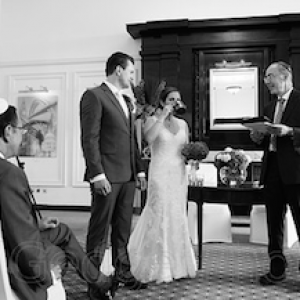 Photos: Philippa Gedge Photography
Photos: Philippa Gedge Photography
In case you’re a bit baffled, let me explain that the groom was marrying a non-Jewess, who, though a regular synagogue-attendee, had no desire to convert, so the rabbi couldn’t conduct the ceremony. I was therefore approached to put together and lead the ceremony.
In the event, I led a (slightly creative) service, containing some elements I had suggested and some the couple had included.
As that bushel has now been removed, I’d like to conclude with the testimonial I received from the couple for that wedding:
“Michael Gordon conducted a Jewish religious wedding ceremony for us immediately following our civil wedding ceremony. Michael was very receptive to our input and the whole process was smooth and pleasant. On our wedding day, Michael impressed everyone with his delivery, warmth, good humour and professionalism. We had many comments afterwards from our guests saying how impressed they were with Michael and how they felt a part of the ceremony (something that was important for us and which Michael helped us to achieve).
“Michael is happy to tailor a ceremony to meet a couple’s particular requirements. His knowledge of Hebrew is both impressive and authentic. We would certainly recommend Michael to any couple who want to add a spiritual or religious element to their wedding celebrations without necessarily having something formal in a church or synagogue.”
C’est magnifique!
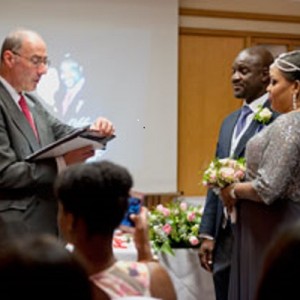
by Michael | Aug 25, 2015 | Blog
There is no reason why life-cycle ceremonies should be confined to the young. Those who are young at heart (or who actually admit to being “more mature”) can enjoy the benefits too.
Weddings
Why marry at a later age?
- To ‘live a bit’ before having a family
- to establish a career first
- to be sure the relationship will work
- to have another go (remarriage after divorce or death)
- as a gay couple, to convert their legal status
Should it be different from a younger couple’s wedding?
In practice, a wedding (civil or religious) can be the same for any couple (but please note that I would not expect any two civil weddings I conduct to be identical!).
Age may dictate a few differences – some more subtle than others:
- the mature couple may prefer a smaller ceremony, especially if they have already experienced a big first wedding
- the mature couple may now have their own families, and want to involve them
- they may prefer more age-specific readings
- a mature wedding may be more fun! There’s less likely to be family pressure, so they can choose what they want to include and whom to involve – they can dictate ceremony tone and content, clothing, celebrant, venue and guests
- a mature couple may not want wedding presents – instead, people can be given the opportunity to contribute to a charity of the couple’s choosing
- a ritual like “jumping the broom” may not be advisable for less sprightly people!

Vow Renewals
For a full discussion about Vow Renewals (why have one and how to mark it), please click on this blog link.
Vow Renewals have deservedly been gaining in popularity. Like weddings (see above), the couple nowadays has tremendous freedom of choice. Their event can reflect their personality, beliefs and wishes, so is often unforgettably unique. Of course, a good civil celebrant’s suggestions and advice will be invaluable in putting this together.
So a more mature couple should not feel deterred by age or even infirmity. The choices are out there – a small or large ceremony, religious, non- or part-religious, in a back garden, hot air balloon, dining room, castle etc., formal or less so, intimate or large-scale. The important thing is for the couple to choose what they are happy with so that they can enjoy a memorable and meaningful special day.
Then they can show those young whippersnappers a thing or two!

by Michael | Jul 28, 2015 | Blog
Who’d have an outdoor ceremony? Especially in the UK!
In the past few weeks of so-called summer, London has enjoyed (if that’s the right word!) temperatures in the high 30s and also spells of torrential showers with maximum temperatures below 20 degrees. I guess I’m rather relieved that I didn’t have an outdoor ceremony to conduct in that period!
So does that mean that you shouldn’t even consider an al fresco ceremony?
The weather cannot be predicted in the UK – or virtually anywhere else, for that matter. (Let’s ignore the Atacama Desert, etc., for the purposes of this article.) So outside is always going to be a gamble. Is that a reason not to hold such a ceremony, then?
Advantages
- One reason to hold a ceremony outdoors is that you can save money. You still have to get permission and pay the appropriate fee (unless you’re using a back garden), but this may well cost less than booking a hotel or restaurant.
- You may have a particular attachment to a certain place – maybe you first met or got engaged there. One Vow Renewal I led took place beside a canal for the simple reason that the couple were canalboat addicts.
- If it all comes together, there is a wonderful, unique atmosphere about being outside, especially if the setting is special.
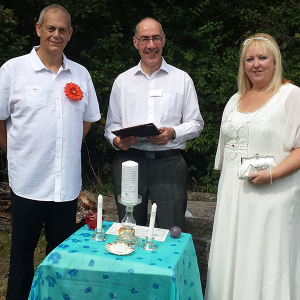
Precautions
Things can go wrong (indoors as well as out), but the main thing to prepare for when outdoors is the weather.
Every venue is different, but if you have a courtyard, say, with a portico, then that offers guests refuge from rain or strong sun. Job done! However, you will still have to consider protection for yourselves and the celebrant in the event of extreme conditions.
The bride will have to consider her footwear, if there’s heavy rain about, and her train, if she has one. Wind can play havoc with her hair, veil and dress.
Parasols or golf umbrellas may be worth investing in, if people are likely to be in exposed places for long. And if you actually get a hot and sunny day, then arrange for water to be available for guests and also for yourselves and your celebrant.
Finally, if the weather is likely to be really cold, then invest in some blankets, at least for older people.
One of the other things you will have to take into account is sound projection. Are you going to need a PA system? How big a ceremony is it likely to be? If you need a sound system, your civil celebrant or possibly whoever is providing music for later may be able to supply one, but you’ll have to investigate.
Some of the most enjoyable ceremonies I have officiated at have been outdoors, but I have not appreciated reading from my script beneath pouring rain! And as for being pursued by an aggressive wasp during the ceremony …!
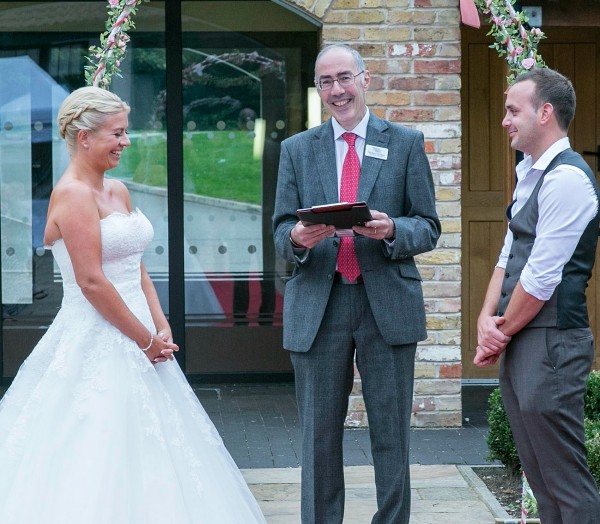
by Michael | Jul 7, 2015 | Blog
I do appreciate that not everyone understands what I offer. Although there have been civil celebrants in this country for more than fifteen years to my knowledge, there is still widespread ignorance about our role and the benefits that we can provide.
To clarify things, I’d like to focus on three ceremonies I created and performed in the not-too-distant past. I’d like to think that these will shed light on what is on offer and even give you some food for thought.
Handfasting
Imagine holding an open-air wedding ceremony on an Iron Age hill-top fort!
That’s what Annie and Ross organised. They were an interesting pairing: she was pagan and he was half-Jewish. They asked me to put together a ceremony that would reflect both religions. A challenge I enjoyed rising to!
As soon as they had done the legal bit in Salisbury Register Office they, and their entourage, headed up the hill to where I, in my robes, and my table was awaiting them.

After a welcome, explanations were offered before each ritual.
The Jewish part involved the bride circling the groom seven times while he read out certain traditional statements (in English) about a “woman of valour”. He also broke a glass underfoot at the end to the traditional cries of “Mazal tov!”.
The pagan parts included charging the circle, summoning the elements of nature, drawing down the God and Goddess, reciting handfasting vows, and drinking from the Loving Cup.
A very special occasion.
Canalside Vow Renewal
Another happy outdoor ceremony took place at Basingstoke Canal Centre.
C. and S. were celebrating 25 years of marriage and had invited friends and family to their beloved canalside location. It was hot and humid – indeed, it cannot be claimed that we remained totally dry, but nobody minded.

We convened in a grove with benches arranged in a semi-circle. I brought a table and unity candle and off we went. One highlight was the personal celebrant address, which touched on some of the events – happy and a few sad – over the thirty years the couple had known each other. Some favourite songs were played. A simple, cheerful, yet moving ceremony was the outcome.
Wedding Blessing
A completely different setting was the prestigious British Medical Association House in the heart of London. The couple had requested the legal ceremony (with the registrars) before my turn came to bless them. In contrast to the formality of the first part, this was more relaxed and although some beautiful, memorable words were spoken, smiles and even laughter were an integral part of the proceedings (even before the wine in the Loving Cup was shared!) and all went away to the reception more than satisfied with the formalities.
I hope this gives a flavour of the variety of ceremony that a Civil Celebrant can offer. I would certainly be happy to answer any questions this article may give rise to.
by Michael | Mar 24, 2015 | Blog
I’m a dinosaur. I’m not entirely proud of the fact, and occasionally do manage to move with the times a bit. But I am gradually coming to terms with the fact that social media in the wedding world are here to stay.
Certainly, seeing photos online the day after the wedding is very desirable.
However, I feel that the occasion is diminished by legions of smartphone-users raising arms every moment to capture yet another picture. It detracts from the atmosphere, spoils the view of other guests and can ruin the shots of the photographer whom the couple may have paid to be there.
Some weddings are now being referred to as “insta-weddings” because of the social media frenzy they generate.
Couples will have their own opinions. A British study of brides’ expectations shows that nearly half believe it is important to enforce digital rules on wedding guests, with one in seven wishing mobile phones could be banned.
It’s something for you to consider, and here are a few thoughts that may help you make up your mind.
Before the event
• Engagement/wedding
Make sure you inform your family and close friends before posting the news online.
• Invitations
E-vites are an acceptable use of social media.
Invitation replies
Probably safer to ask people to use Royal Mail. You need to track the replies, and this may work out more reliable than FaceBook and the like.
At the event
Rules
In my experience, most couples feel that there should be rules about social media. These rules vary, of course, but many believe that it should be the couple who are the first to post wedding photos on a social media site. A lot also feel that bridesmaids should not be allowed to upload photos of brides before the ceremony.
Whatever you decide, you need to inform your guests clearly. It pays to communicate with your guests.
Of course, people should be welcome to take photos of themselves, if they want.
Afterwards
Do send out ‘thank you cards’ – but not by e-mail or social media. They ought to be hand-written.
Social Media Ideas
In certain cases, friends of the pair may create a hashtag handle for tweeting and photo-sharing. This also ensures that each wedding is distinctive. Useful, if you happen to be invited to a whole lot of weddings in one season.
A bride can nowadays designate a “Tweeter of Honour”, if she has too much to occupy herself with.
Instagrams can show natural, unforced moments. Nonetheless, it’s very rare that such photos beat the professional photographer’s shots.
Advantages of photo-sharing are that guests can contribute to a designated wedding album and, of course, those unable to attend, may be able to see photos or even live streams.
Beware of overkill, by the way. Thousands of posts before the wedding will be a turn-off.
Whether or not you opt for social media, moderation is advisable – and do make sure you communicate your wishes to your guests.

 Photos: Philippa Gedge Photography
Photos: Philippa Gedge Photography




